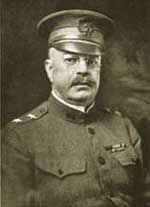Joseph Theodore Dickman

Amerikansk generalmajor. Chef for 3. division 15. november, 1918 til 19. april 19, 1919.
- Aisne-floden III, 1918
Joseph Theodore
Dickman was born 6 October 1857 in Dayton, Ohio. He attended the University
of Dayton and graduated in the class of 1871. In 1881 he graduated from
the U.S. Military Academy at West Point and was commissioned in the 3rd
Cavalry. His career highlights include:
Cavalry School, 1883
Apache War, 1885-86
Geronimo Campaign
Mexican border patrol operations against Garza revolutionists and the
bandits, Benavides and Gonzales.
Instructor, Cavalry and Light Artillery School, Fort Riley, 1893-94. Deployed
to Chicago railroad strike in 1894.
Fort Ethan Allen, Vermont, 1894
Spanish-American War, 1898
Battle of San Juan Hill-El Caney, Santiago de Cuba
Service on staff of General Joseph Wheeler
Philippine Insurrection, 1899-1902
Battles on Island of Panay, 1899-1900
Boxer Rebellion, 1900
Chief of Staff to General Adna R. Chaffee, Peking Relief Expedition
Battle at Pa-ta-Chao, Peking, 26 September 1900
Army General Staff, Washington, D.C., 1902
Army War College, 1905
Inspector General, U.S. Army, 1912
Commander, 2nd Calvary, 1915-17
Brigadier General, May 1917
Commanding General, 85th Infantry Division, Camp Custer, Michigan, August
1917
Commanding General, 3rd Inf. Div., Nov. 1917
Deployed 3rd Div. to France aboard the Leviathan at noon, 4 March 1918
Chateau-Thierry, May 1918
Marne II Offensive, Jul. 1918. While allied forces on both flanks retreated,
the 3rd Div. stood fast in the face of fantastic enemy offensives, thus
becoming known as, "The Rock of the Marne."
Commanding General, IV Corps, Aug.-Sep. 1918
Saint-Mihiel Offensive, Sep. 1918
Commanding General, I Corps, Oct.-Nov. 1918
>Meuse-Argonne Offensive, Sep.-Nov. 1918
Commanding General, Third Army, Nov. 1918-Apr. 1919
Established by General Pershing in France to advance to the Rhein and
hold the Coblenz bridgehead, then prepare to serve after the war as the
Army of Occupation. The Third Army would have become the Army of Occupation
whether or not the enemy signed the peace agreement. American fighting
units not sent home were consolidated under Third Army and prepared to
attack if Germany did not accept the terms of peace. The United States
itself was not to sign the agreement but remained technically at war with
Germany for two more years.
President, Tactics and Organization Board, which reported on lessons learned
during the war, April-July 1919.
Commanding General, Southern Dept. and VIII Corps Area, 1919-21
Retired 6 October 1921
Recalled to preside over postwar-Army downsizing board, 1922.
Included among his awards and decorations are: the Distinguished Service
Medal; Croix de Guerre, France; Order of Leopold, Belgium; Grand Officer
of the Crown of Italy; Commander of the Legion of Honor, France; Knight
of the Bath, England; and La Solidaridad, Panama. The honorary degree
of LL.D. was conferred on him by the University of Vermont. His memoirs
were published in 1927. He died in Washington, D.C., on 23 October 1928.